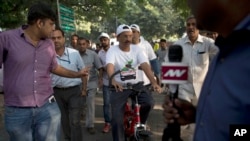One of the world's most polluted capitals, New Delhi, closed a major stretch of a road to private cars for a few hours Thursday, hoping to give its citizens a brief breath of fresh air by observing a car-free day.
Only public transport was allowed on the road from Old Delhi to the doorstep of Parliament.
The city's top elected official, Chief Minister Arvind Kejriwal and his cabinet colleagues, led hundreds of cyclists as they pedaled the route to encourage people to use public transport.
"All of us have to do our bit to decongest the roads and to reduce pollution. People should leave their cars and start using public transport and bicycles," Kejriwal said as he prepared to lead the cyclists.
Although the event covered only a six-kilometer (4-mile) stretch, many people hailed the government's effort as a first step to clean the city's heavily polluted air.
"Even though it's only for a few hours, it's a very good start. We have to get people thinking about the harm air pollution is doing to our health," said Sunil Kumar, an environmental activist who cycled to the event.
Others said closing just one road for five hours would not make a dent in the heavy, particulate-ridden air in the capital.
Delhi's Transport Minister Gopal Rai said the idea was change peoples' mindsets about using public transport.
"We want to encourage people to use buses, the metro, rickshaws and other public transport so that pollution levels can be brought down in Delhi," Rai told reporters.
The sources of New Delhi's air pollution are numerous — from the burning of agricultural fields of neighboring farmland states to the smoking factories and brick kilns on the city's outskirts. Another major cause is blamed on crude cooking stoves fueled by burning biomass, kerosene or cow dung in villages around Delhi.
And car ownership is climbing rapidly in the country of 1.2 billion, up from 20 million in 1991 to 140 million in 2011. It is expected to reach 400 million by 2030.
There has been increasing evidence that the city's dirty air is also affecting health, making Indians more susceptible to heart disease and cancer that are caused or exacerbated by air pollution, with the World Health Organization saying air pollution kills more than 627,000 in India each year.
Traffic was sparse in the rest of the city Thursday on account of the Hindu festival of Dussehra. Schools, colleges, businesses and government offices were closed and most people stayed home.




